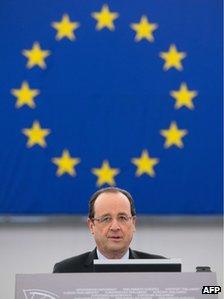France takes aim at Britain
- Published
- comments

Mr Hollande gave his speech two days before the budget summit
French President Francois Hollande is preparing for a tough negotiation this week over the EU budget. Speaking at the European Parliament, he said "the negotiations are very difficult'' and there is not, in his view, a deal in place.
If there is a fight, the French finger of accusation seems to be already pointing at Britain. Several countries agree with the UK in seeking a freeze in EU spending allowing for inflation but Prime Minister is seen as taking the hardest line over future spending. There are persistent rumours that further budget savings will be proposed by cutting back on infrastructure and energy projects. President Hollande indicated he would oppose such cuts. "Yes to making cuts," he said, "but no to weakening the economy."
The French president also criticised Britain for clinging on to its rebate, which is worth about £3bn (3.5bn euros; $4.7bn) a year. ''There are those who want to see cuts," said Mr Hollande, "[and] others - possibly the same - who want guarantees on their own rebate." He is likely to have the support of Italian Prime Minister Mario Monti in making this argument.
Francois Hollande is due to meet German Chancellor on Wednesday. David Cameron spoke to her on Monday and afterwards Downing Street briefed that the two leaders had agreed that the current proposal on the table - 973bn euros over seven years - had to be reduced further. The Germans, who were optimistic last week that a deal could be done, will come under pressure in Paris to compromise.
But President Hollande's first speech to the European Parliament was very much aimed at his own voters. During the election last year he made growth his priority. This speech, in part, was an explanation as to why he has not been able to deliver. Since he took office, unemployment in France has continued to rise and now stands at 10.7%. In the third quarter last year, France registered almost no growth and its forecasts for this year are probably overly optimistic. Consumer confidence in France is weak.
So where does the fault lie? Firstly, the strong euro which has strengthened in recent weeks. The French president fears it will harm French exporters and so weaken growth. The euro, he said, should not be allowed to "fluctuate depending on the markets' mood". He did not call for exchange rate targets but there will be international concern that, as countries jostle for export markets, a battle over currencies will follow.
The French president also put pressure on Germany when he said that strong eurozone states must act to increase demand. It has been a familiar French theme. The view in Berlin is that France has been slow to embrace structural reforms like making it easier to hire and fire workers that would, in the long term, boost growth. They see the French president as being unwilling to confront his natural supporters, the unions.
The president said that the eurozone had largely put its crisis behind it but could not afford endless austerity. He warned that national interests were threatening to overtake European interests. In what seemed another reference to Mr Cameron, he said that there could not be a two-speed, or a la carte, Europe. We must move forward together, he said, or we will not move forward at all.
- Published5 February 2013
- Published20 January 2013
- Published24 September 2015